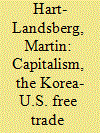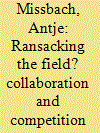|
|
|
Sort Order |
|
|
|
Items / Page
|
|
|
|
|
|
|
| Srl | Item |
| 1 |
ID:
106349


|
|
|
|
|
| Publication |
2011.
|
| Summary/Abstract |
Free trade agreements (FTAs) have become an essential part of the corporate effort to establish a global infrastructure suitable to its contemporary accumulation dynamics. Because they establish and reinforce patterns of economic activity that are destructive of majority interests, they should be opposed. This article scrutinizes one agreement: the Korea-U.S. FTA. It examines the motivations that led to its negotiation, the content of the agreement, and the arguments U.S. government officials and institutions have made in support of its ratification. It concludes with a critical evaluation of the efforts of U.S. and Korean opponents of its ratification and a call for a new organizing strategy.
|
|
|
|
|
|
|
|
|
|
|
|
|
|
|
|
| 2 |
ID:
106352


|
|
|
|
|
| Publication |
2011.
|
| Summary/Abstract |
In March 1973, a villager working for a logging concession in Northeastern Thailand was shot and killed under mysterious circumstances. The story did not make the news and would likely have been forgotten if not for another, more sensational murder-suicide a few weeks later. Working through news reports in the country's number one daily about these two crimes, this article brings to light the understudied terror and violence that plagued parts of rural Thai society preceding the mass protests against a corrupt military government in October 1973. At the same time, it analyzes how information about that violence became known, verified, and accepted as true to an urban audience in Bangkok. Tackling the issues of violence and information together, the author links the relatively abstract concepts of "knowledge production" and "justice" in a tangible case study, showing that the form that information takes and the technologies that produce it play a key role in determining its factuality. The author concludes that in Thai society today, historical truth and social justice emerge through a contingent process of documentation; without documents there is no historical knowledge and no justice.
|
|
|
|
|
|
|
|
|
|
|
|
|
|
|
|
| 3 |
ID:
106351


|
|
|
|
|
| Publication |
2011.
|
| Summary/Abstract |
After the end of almost thirty years of armed conflict in 2005 and following a devastating tsunami in 2004, Aceh has become a "social laboratory" for foreign researchers who study Indonesia's northern-most province from every angle. Over the last five years, this effort has resulted in the publication of a considerable number of articles in major journals. For some foreign researchers, Aceh became a fast track accelerating their careers. Yet, how much did local Acehnese researchers benefit from being at the center of this scholarly attention, and how much were they able to participate in academic debates? To answer these questions, this article examines the involvement of Acehnese scholars in the process of knowledge production in and about contemporary Aceh. One of the key findings is that local researchers are often involved in data collection, but left out from its analysis and interpretation due to a general lack of structural conditions for publishing, such as under-funding, lack of access to major academic literature, and language barriers. Embedding this inquiry about research cooperation and competition in wider debates about representation and academic development support, this article stresses critical evaluations of current academic ventures. Moreover, Aceh as a post-conflict/tsunami site illustrates the enormous difficulties that developing countries such as Indonesia face in tertiary education and academic research. Long-standing structural imbalances responsible for uneven research outcomes cannot disappear overnight or only as a result of foreign educational initiatives. Nevertheless, this article introduces a specific example of short-term academic collaboration named Aceh Research Training Institute (ARTI)-a flicker of hope in an otherwise rather unpromising situation.
|
|
|
|
|
|
|
|
|
|
|
|
|
|
|
|
| 4 |
ID:
106350


|
|
|
|
|
| Publication |
2011.
|
| Summary/Abstract |
This article seeks to interrogate the idea of "race," nation, and multiculturalism in Malaysia from the perspective of cultural studies, in particular that of cultural translation and postcolonial theory. It employs the concept of cultural translation to examine the processes of cultural change and transfer both from the perspective of state policies and nationalistic discourses as well as the discourses and practices of the people. The central idea is to argue for a more flexible understanding of race identities in the move toward a conceptualizing of Malaysian-ness as a national and cultural identity that takes into account the social practices and experiences, imaginings, and expressions of the people. A reading of Yasmin Ahmad's film Sepet lends credence to the article's assertions about the emergence of trans-racial identities on the ground that contest the pedagogic stability of state-defined race identities. The article enters debates on the politics of race and identity in Malaysia through the controversial state-initiated concept of Bangsa Malaysia, which it here advances as an alternative model of multiculturalism and national belonging that effectively displaces the National Culture Policy as well as other hegemonic cultural formulations and political constructions.
|
|
|
|
|
|
|
|
|
|
|
|
|
|
|
|
|
|
|
|
|